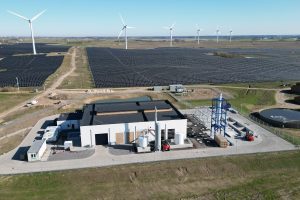Proton exchange membrane (PEM) electrolyzers run with separate catalysts for each of its electrodes (cathode and anode). The cathode catalyst yields hydrogen, while the anode catalyst forms oxygen. A problem is that the anode catalyst uses iridium, which has a current market price of around $5,000 per ounce. The lack of supply and high cost of iridium pose a major barrier for widespread adoption of PEM electrolyzers. The main ingredient in the team’s new catalyst is cobalt, which is substantially cheaper than iridium.
Giner Inc., a research and development company working toward commercialization of electrolyzers and fuel cells, evaluated the new catalyst using its PEM electrolyzer test stations under industrial operating conditions. The performance and durability far exceeded that of competitors’ catalysts.
The team’s achievement is a step forward in DOE’s Hydrogen Energy Earthshot initiative, which mimics the U.S. space program’s ‘Moon Shot’ of the 1960s. Its ambitious goal is to lower the cost for green hydrogen production to one dollar per kilogram in a decade. Production of green hydrogen at that cost could reshape the nation’s economy. Applications include the electric grid, manufacturing, transportation and residential and commercial heating.
Other contributors to the project include DOE’s Sandia National Laboratories and Lawrence Berkeley National Laboratory, as well as Giner Inc.






